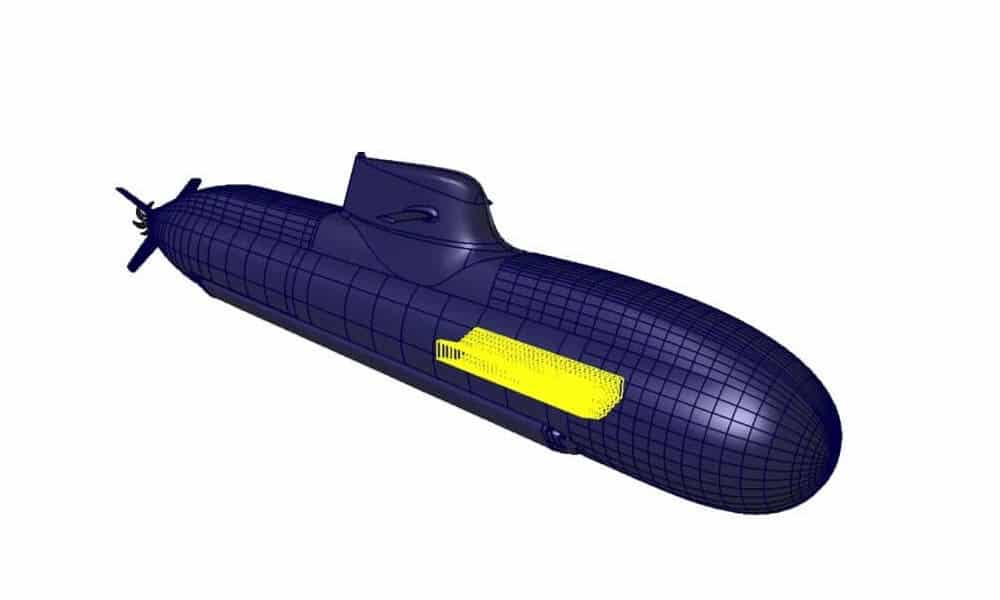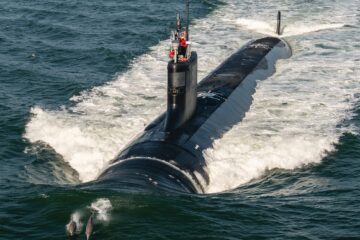Taranto, 24 January 2024- The 6th Programme Committee Meeting took place at the Taranto Military shipyard and was attended by OCCAR-EA Director, Mr. Joachim Sucker, and the Programme Committee Representative, Vice Admiral Giuseppe Abbamonte (IT), bringing together all key stakeholders for a scheduled periodical update as well as to decide on crucial advancements.
One of the meeting’s primary focuses was on the important step ahead for the implementation of a cutting-edge Lithium Battery System on board the submarines. The LBS components prototype passed a relevant performance and safety test pack posing a milestone on the technical path for the implementation onboard.
The decision for lithium reflects a strategic move towards adopting more advanced and sustainable power storage solutions, ready to be implemented in the wider underwater and surface naval scenario.
The Lithium Battery System Tests results envisaged higher submarines’ operational efficiency, simultaneously enhancing propulsion and endurance capabilities, reducing maintenance and granting highest levels of on-board safety.
This technological leap underscores the commitment of Italy to invest in advanced technologies and positioned at forefront of maritime defense capabilities.
Another key aspect addressed during the meeting was the presentation of the roadmap for the activation of the NFS 4 optional package, which will bring the total number of boats to four, along with their Logistic and In-Service Support.
-End-

Naval News comments:
The new underwater air independent propulsion (AIP) platforms under construction for the Italian Navy by the U212 NFS (Near Future Submarine) programme team managed by OCCAR on behalf of Italian MoD’s Naval Armaments Directorate (NAVARM) and involving a large national industry team alongside key international suppliers will have a Lithium-Ion Battery System (LBS) developed and supplied by Italian industries.
The announcement made by OCCAR comes after the “cutting-edge LBS components prototype passed a relevant performance and safety test pack posing a milestone on the technical path for the implementation on board.”
During the Navy Leaders’ Combined Naval Event 2023 in Farnborough, the U212 NFS programme team leader Adm. Maurizio Cannarozzo told Naval News that a decision on the adoption of the LBS by the U212 NFS platforms would have been taken in the same timeline, confirming a key technological development and operational capability being adopted by Italian Navy and the programme positioning at the forefront of maritime defense capabilities.
The decision comes after a rigorous and long-lasted programme which dates back with the launch by Italian MoD’s NAVARM in 2009 of the “Far-Seas” research and development (R&D) programme co-founded by Italian MoD and a national industrial team as part of the National Military Research Programme (PNRM, Programma Nazionale della Ricerca Militare). The latter together with subsequent evolutions have been fully and constantly supported by the Navy’s team of submariners, NAVARM and Italian MoD with funding of the U212NFS programme ensured by the today named Italian Ministry of Enterprises and Made in Italy. The initial industrial team has subsequently evolved and today includes the FIB-FAAM company of Seri Industrial Group, the Power4Future (P4F) joint-venture between Fincantieri SI and Faist Electronics, Fincantieri’s Cetena and the TÜV Rheinland certification body. The LBS includes both the battery management system and the LiFePO4 battery modules.
Naval News understands that this milestone will allow the programme office and the industrial team to pass to the follow-on prototyping and pre-production phase, opening the way to production and installation on board the U212 NFS submarines. The new generation energy storage system will be installed since the first-of-class boat to be delivered in early 2028, Naval News understands. In addition to the U212 NFS platforms, the LBS has been developed in order to be compliant and accommodated on current U212A boats allowing an easy switch to the new technology once the in-service boats will be subjected to the Mid-Life Update (MLU).
The only country so far with Li-ion battery submarines in the water is Japan. South Korea is expected to follow in the near future. France is proposing a Li-ion submarine to Indonesia. Germany’s TKMS is also working on the technology. The technology is slowly becoming a “must have” in modern diesel-electric submarine designs.






